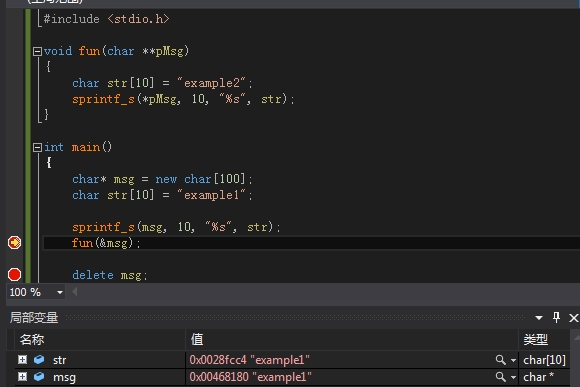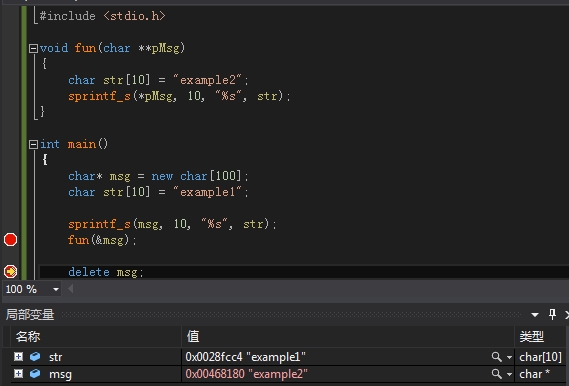70,040
社区成员
 发帖
发帖 与我相关
与我相关 我的任务
我的任务 分享
分享
char* msg = new char[100];
sprintf_s(msg, ...);
char mag[100];
sprintf_s(msg, ...);
函数原型:
int sprintf_s(
char *buffer,
size_t sizeOfBuffer,
const char *format [,
argument] ...
);

int sprintf_s(
char *buffer,
size_t sizeOfBuffer,
const char *format [,
argument] ...
);
template <size_t size>
int sprintf_s(
char (&buffer)[size],
const char *format [,
argument] ...
); // C++ only
template <size_t size>
int sprintf_s(
char (&buffer)[size],
const char *format [,
argument] ...
); // C++ only
int _tmain(int argc, _TCHAR* argv[])
{
char filename[1024];//预先分配缓冲区
char path1[128] = "D:\\Program\\Tesseract-OCR\\tesseract.exe";
char path2[128] = "D:\\Program\\Tesseract-OCR\\";
char path3[128] = "D:\\Program\\Tesseract-OCR\\txt";
char path4[128] = "-l chi_sim";
sprintf_s(filename,1024, "%s %s %s %s",path1,path2,path3,path4); //无论这里是否有1024这个参数,都可以编译通过
return 0;
}
... ...
char* filename = new char[1024]; //这样就会报出编译错误
char path1[128] = "D:\\Program\\Tesseract-OCR\\tesseract.exe";
char path2[128] = "D:\\Program\\Tesseract-OCR\\";
char path3[128] = "D:\\Program\\Tesseract-OCR\\txt";
char path4[128] = "-l chi_sim";
sprintf_s(filename,1024,"%s %s %s %s",path1,path2,path3,path4);
delete []filename;
return 0;
... ...
char filename[1024];//这个可以
char* filename = new char[1024]; //这样就会报出编译错误
char path1[128] = "D:\\Program\\Tesseract-OCR\\tesseract.exe";
char path2[128] = "D:\\Program\\Tesseract-OCR\\";
char path3[128] = "D:\\Program\\Tesseract-OCR\\txt";
char path4[128] = "-l chi_sim";
sprintf_s(filename,"%s %s %s %s",path1,path2,path3,path4);
delete []filename;
#include "stdafx.h"
#include "stdio.h"
int _tmain(int argc, _TCHAR* argv[])
{
//char filename[1024];//这个可以
char* filename = new char[1024]; //这样就会报出编译错误
char path1[128] = "D:\\Program\\Tesseract-OCR\\tesseract.exe";
char path2[128] = "D:\\Program\\Tesseract-OCR\\";
char path3[128] = "D:\\Program\\Tesseract-OCR\\txt";
char path4[128] = "-l chi_sim";
sprintf_s(filename,"%s %s %s %s",path1,path2,path3,path4);
delete []filename;
return 0;
}


void func2(char **pMsg)
{
......
sprintf_s(*pMsg, ...);
......
}
void func1()
{
char msg[100];
func2(&msg);
}